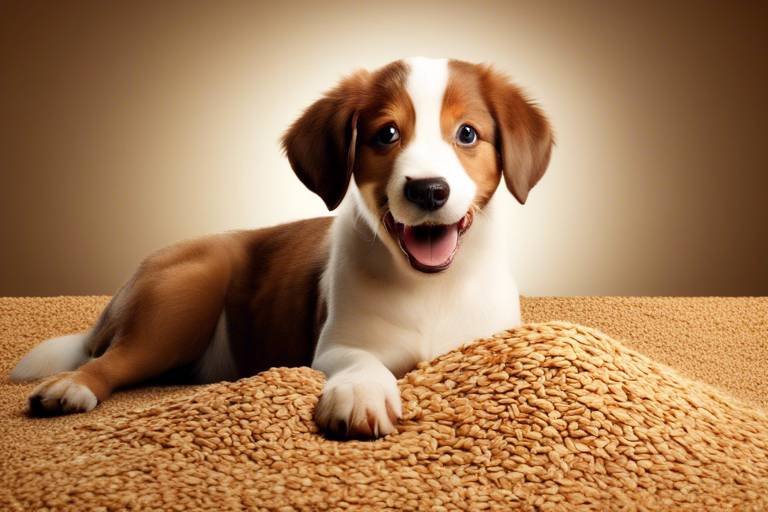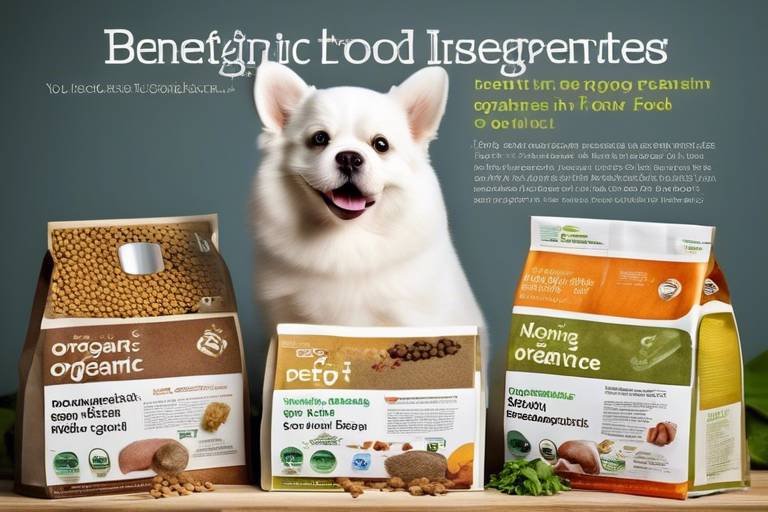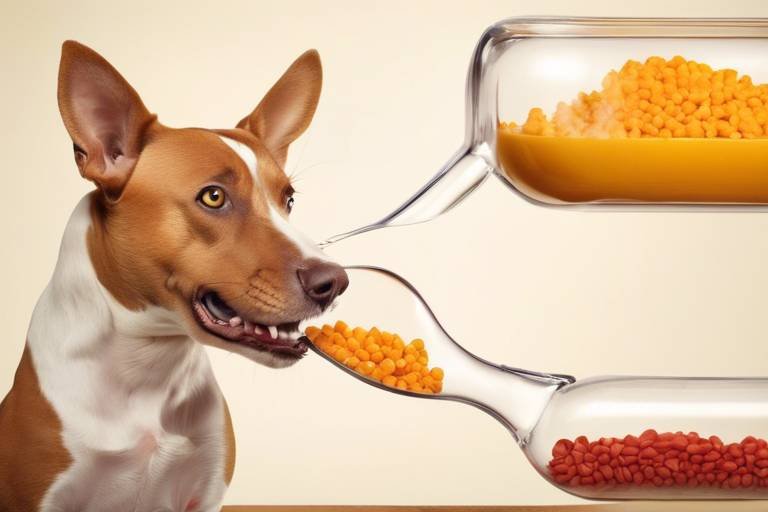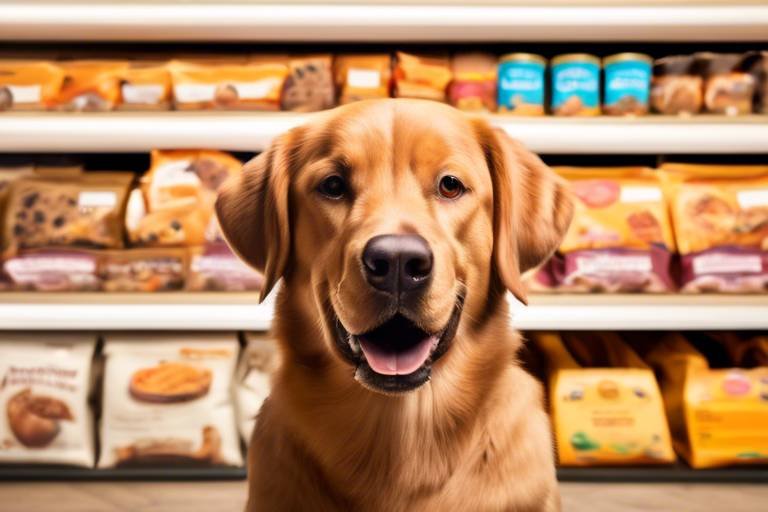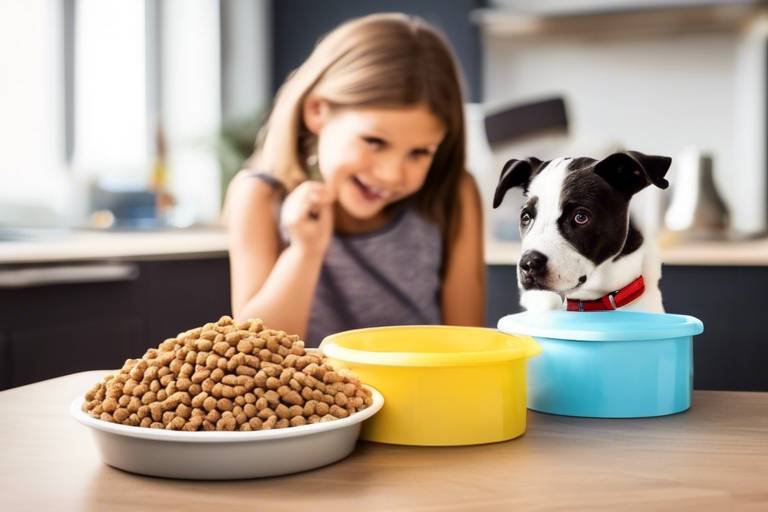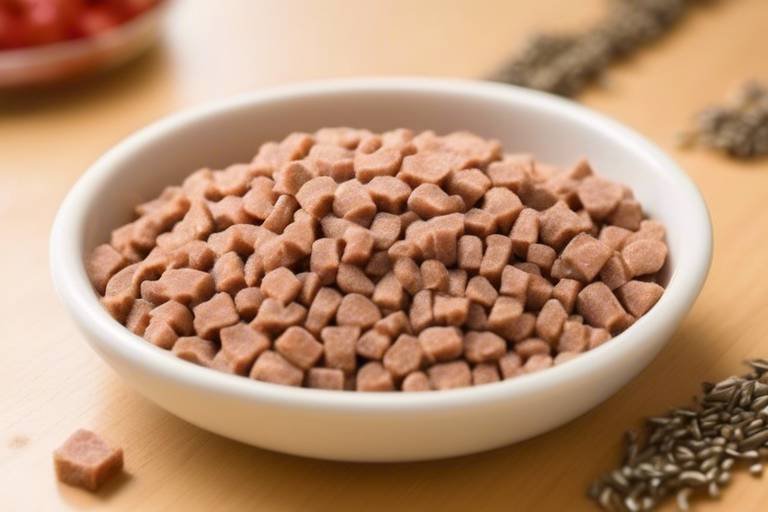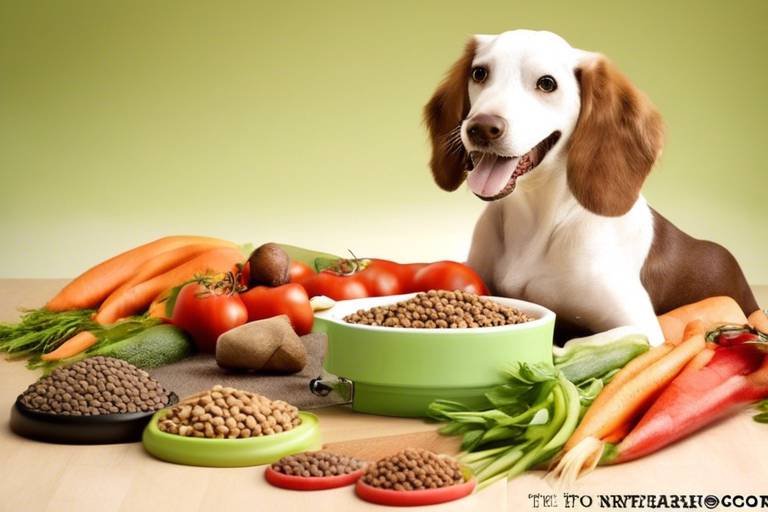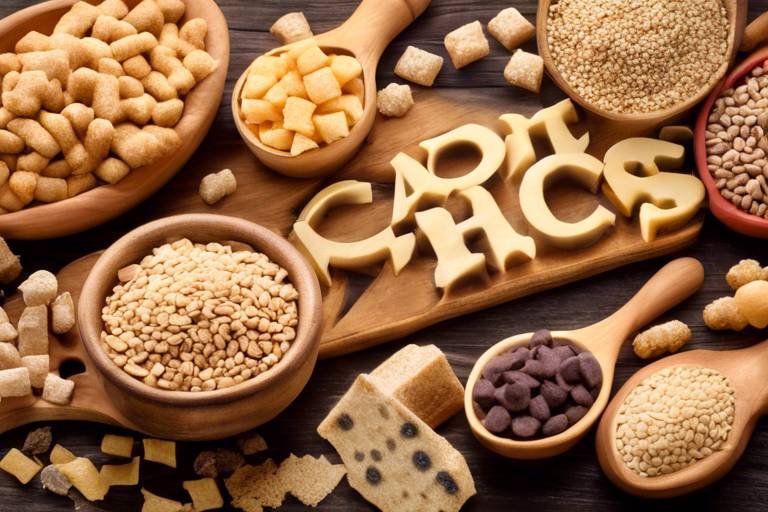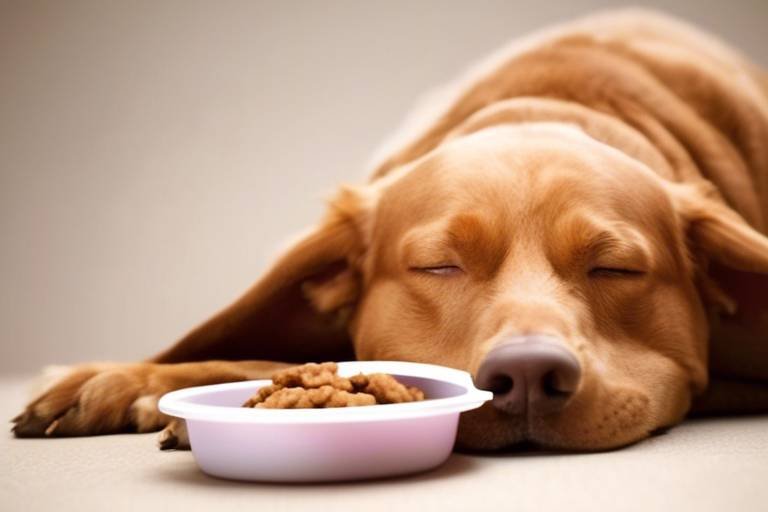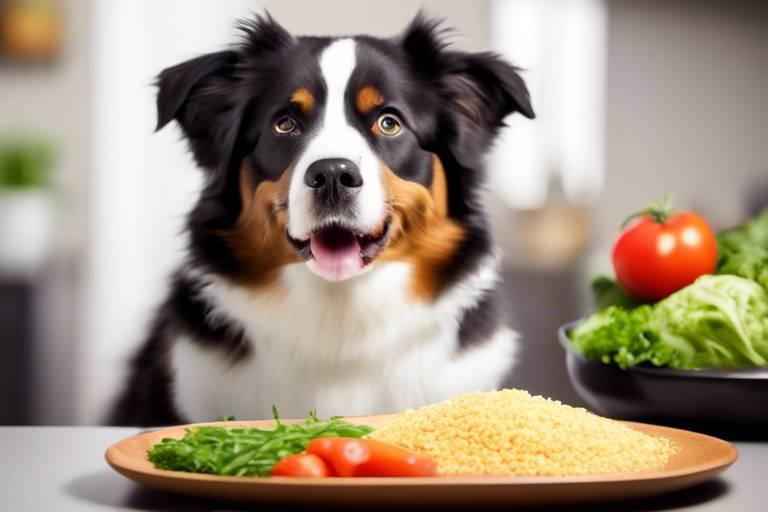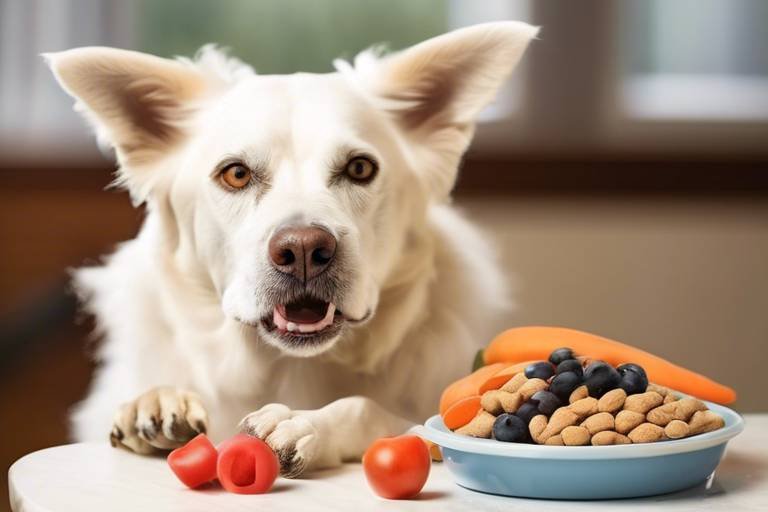The Benefits of Using Whole Grains in Pet Food
In the world of pet nutrition, the phrase "you are what you eat" couldn't be more accurate. Just like humans, our furry friends thrive on a diet rich in nutrients that fuel their bodies and support their overall well-being. One of the most significant trends gaining traction in the pet food industry is the incorporation of whole grains. But what exactly are whole grains, and why should they matter to you as a pet owner? This article explores the numerous advantages of incorporating whole grains into pet food, highlighting their nutritional value, health benefits, and impact on pet well-being.
Whole grains are not just a trendy ingredient; they are packed with essential nutrients that are crucial for your pet's health. These grains include oats, brown rice, barley, and quinoa, which are rich in vitamins, minerals, and fiber. When you choose pet food that includes whole grains, you're providing your pet with a balanced diet that supports their overall health and vitality. For instance, whole grains are an excellent source of B vitamins, which play a vital role in energy metabolism, and minerals like magnesium and iron that are essential for various bodily functions. It's like giving your pet a nutrient-packed superhero cape to help them thrive!
One of the standout benefits of whole grains is their ability to promote healthy digestion in pets. The dietary fiber found in these grains acts as a natural broom, sweeping through the digestive tract and helping to maintain regular bowel movements. This is crucial because a happy gut often leads to a happy pet! Without adequate fiber, pets can experience a range of gastrointestinal issues, from constipation to diarrhea, which can be uncomfortable and distressing for them.
The fiber found in whole grains plays a pivotal role in regulating digestion. It ensures that pets can efficiently process their food and absorb nutrients effectively. Think of fiber as a traffic cop for your pet's digestive system, directing the flow of food and preventing any unwanted backups. When pets consume a diet rich in fiber, they are less likely to experience digestive disturbances, which means fewer vet visits and more playtime!
A diet high in fiber from whole grains can significantly help in preventing constipation in pets. Just like how we feel sluggish and uncomfortable when we're backed up, pets can experience similar discomfort. By including whole grains in their diet, you can promote a healthier digestive tract and overall comfort. A well-functioning digestive system means your pet can enjoy their meals without the fear of discomfort later on.
Whole grains also contribute to a balanced gut microbiome, which is essential for overall health. A healthy gut flora supports the growth of beneficial bacteria that enhance digestion and immune function. It's like creating a thriving community of good bacteria that work together to keep your pet healthy. When the gut microbiome is balanced, pets are less prone to infections and other health issues, allowing them to lead happier, more active lives.
Another fantastic benefit of whole grains is their role in weight management for pets. Whole grains provide a feeling of fullness, which helps control hunger and reduces the chances of overeating. This is especially important in today's world, where obesity is becoming a significant health concern for pets. By incorporating whole grains into your pet's diet, you can help them maintain a healthy weight, which is crucial for their long-term health. Think of whole grains as a natural appetite regulator that helps keep your pet in tip-top shape!
For many pets, food allergies can be a real pain—literally! Incorporating whole grains can help manage food allergies, as they are less likely to cause allergic reactions compared to some processed grains. If your pet has been scratching, biting, or experiencing gastrointestinal issues, it might be time to evaluate their diet. Whole grains often serve as a safer alternative, allowing you to provide your pet with the nourishment they need without the risk of triggering an allergy.
Identifying and eliminating common allergens in pet food can lead to better health outcomes. Many processed foods contain ingredients that can be problematic for sensitive pets. By opting for whole grains, you can reduce the risk of allergic reactions and promote a healthier lifestyle for your furry friend.
Selecting appropriate whole grains for pet food is crucial, as different grains offer varying nutritional benefits and potential allergens. Some pets may thrive on brown rice, while others may do better with oats or barley. It's essential to consult with your veterinarian to determine the best whole grains for your pet's specific needs. Think of it as customizing a diet plan that fits your pet's unique lifestyle and health requirements.
- What are whole grains? Whole grains include the entire grain kernel, which consists of the bran, germ, and endosperm. Examples include oats, brown rice, and barley.
- Are whole grains safe for all pets? While most pets can benefit from whole grains, it's essential to consult with your veterinarian, especially if your pet has specific dietary restrictions or allergies.
- How do whole grains help with weight management? Whole grains are high in fiber, which promotes a feeling of fullness and helps control hunger, reducing the likelihood of overeating.
- Can whole grains help with allergies? Yes, whole grains are often less likely to cause allergic reactions compared to processed grains, making them a safer alternative for sensitive pets.
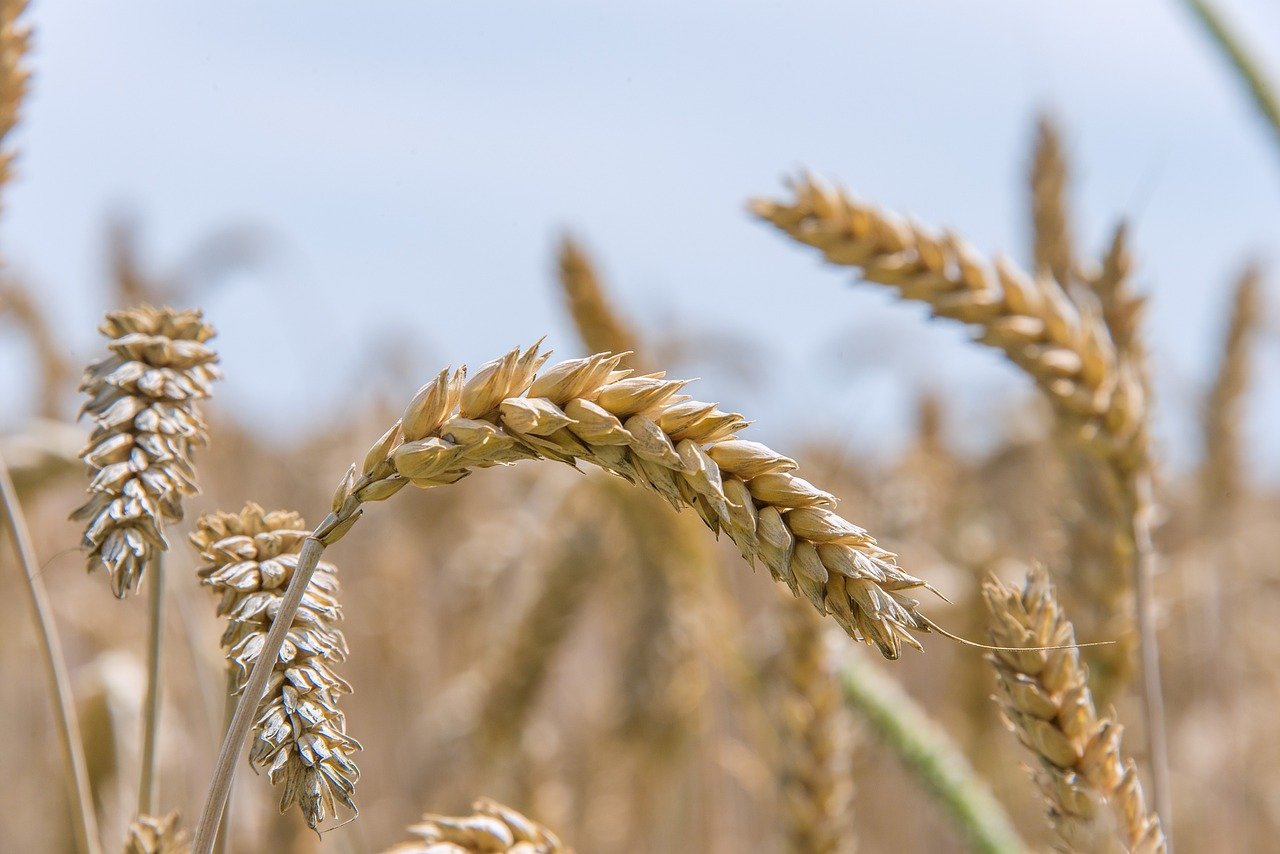
Nutritional Value of Whole Grains
This article explores the numerous advantages of incorporating whole grains into pet food, highlighting their nutritional value, health benefits, and impact on pet well-being.
Whole grains are a powerhouse of essential nutrients that can significantly enhance the diet of your furry friends. Unlike processed grains, which often lose their nutritional punch during refining, whole grains retain their natural goodness, offering a multitude of benefits. They are packed with vitamins, minerals, and fiber, all of which are crucial for maintaining your pet's overall health and vitality.
One of the standout features of whole grains is their high fiber content. This fiber is not just a filler; it plays a vital role in your pet's digestive health, helping to regulate bowel movements and keep things moving smoothly through the gastrointestinal tract. Additionally, whole grains are rich in B vitamins, such as thiamine and niacin, which are essential for energy metabolism. They also provide important minerals, including iron, magnesium, and selenium, which are integral to various bodily functions.
| Nutrient | Function | Sources in Whole Grains |
|---|---|---|
| Fiber | Aids digestion and regulates bowel movements | Oats, brown rice, barley |
| B Vitamins | Supports energy metabolism | Quinoa, whole wheat, millet |
| Iron | Essential for oxygen transport in the blood | Oats, brown rice, whole wheat |
| Magnesium | Supports muscle and nerve function | Barley, quinoa, whole wheat |
| Selenium | Antioxidant that protects cells | Brown rice, whole wheat, oats |
Moreover, the incorporation of whole grains can lead to a balanced diet that not only nourishes but also supports your pet's immune system. The antioxidants found in these grains help combat oxidative stress, which can lead to various health issues. Think of whole grains as nature’s multivitamin for your pet, providing a spectrum of nutrients that work together to promote health and longevity.
In conclusion, the nutritional value of whole grains is undeniable. They offer a holistic approach to pet nutrition that not only satisfies hunger but also contributes to a healthier, happier life for your beloved companions. By choosing pet food that includes whole grains, you are investing in their well-being and ensuring they receive the best possible nutrition.
Whole grains promote healthy digestion in pets by providing dietary fiber, which aids in maintaining regular bowel movements and preventing gastrointestinal issues.
The fiber found in whole grains helps regulate digestion, ensuring that pets can efficiently process their food and absorb nutrients effectively.
A diet high in fiber from whole grains can help prevent constipation in pets, promoting a healthier digestive tract and overall comfort.
Whole grains contribute to a balanced gut microbiome, supporting the growth of beneficial bacteria that enhance digestion and immune function.
Whole grains can aid in weight management for pets by providing a feeling of fullness, helping to control hunger and reduce overeating.
Incorporating whole grains can help manage food allergies in pets, as they are less likely to cause allergic reactions compared to some processed grains.
Identifying and eliminating common allergens in pet food can lead to better health outcomes, and whole grains often serve as a safer alternative.
Selecting appropriate whole grains for pet food is crucial, as different grains offer varying nutritional benefits and potential allergens.
- What are whole grains? Whole grains are grains that contain all parts of the grain kernel: the bran, germ, and endosperm.
- Are whole grains safe for all pets? Generally, most pets can benefit from whole grains, but it’s best to consult your veterinarian, especially if your pet has specific dietary needs.
- How do whole grains support pet health? Whole grains provide essential nutrients, fiber for digestion, and help manage weight and allergies.
- Can I feed my pet whole grains directly? While some whole grains can be cooked and fed to pets, it's important to ensure they are included in balanced pet food formulations.
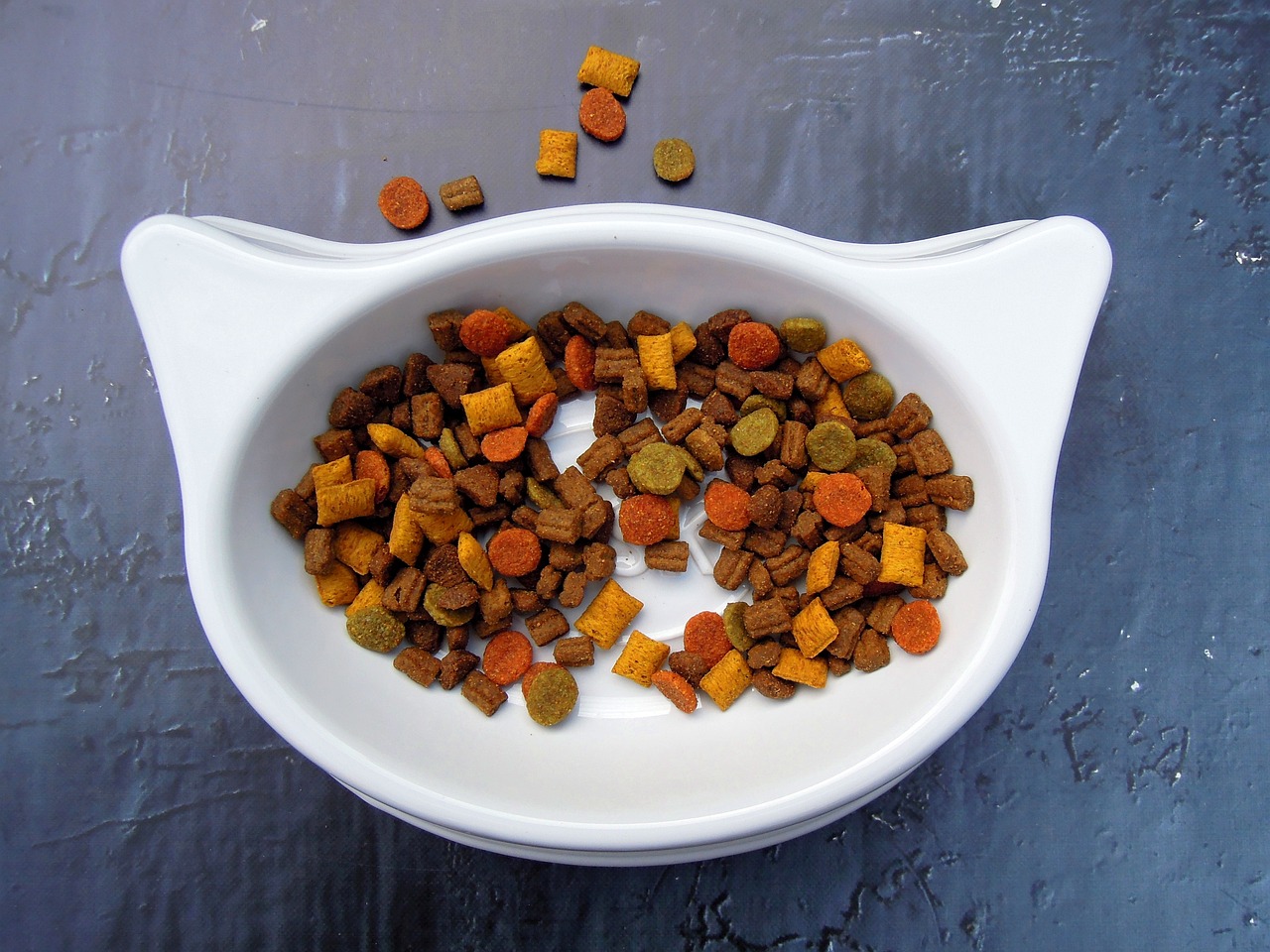
Digestive Health Benefits
When it comes to our furry friends, their digestive health is paramount. Just like us, pets need a well-balanced diet to keep their tummies happy and their bodies functioning optimally. This is where whole grains come into play. By incorporating whole grains into pet food, we can significantly enhance their digestive health. Whole grains are packed with dietary fiber, which is essential for maintaining a healthy digestive system. But what exactly does this mean for your pet?
First off, the fiber found in whole grains plays a crucial role in regulating digestion. Think of fiber as the brush that sweeps through the intestines, helping everything move smoothly along. This means that pets can efficiently process their food, leading to better nutrient absorption. If you've ever experienced a sluggish digestive system, you know how uncomfortable it can be. The same goes for our pets! A diet rich in whole grains can help prevent those uncomfortable moments and keep their digestive tracts running like a well-oiled machine.
Let’s dive a bit deeper into the specifics of fiber. There are two main types of fiber: soluble and insoluble. Both play a vital role in digestion, but they do so in different ways. Soluble fiber dissolves in water, forming a gel-like substance that can help slow down digestion and stabilize blood sugar levels. On the other hand, insoluble fiber adds bulk to the diet, promoting regular bowel movements and preventing constipation. By including whole grains in your pet’s diet, you ensure they receive a healthy balance of both types of fiber, leading to optimal digestive health.
Constipation can be a real pain—literally! It can lead to discomfort, pain, and even more serious health issues if left unchecked. A diet high in fiber from whole grains can help prevent constipation in pets. Imagine your pet's digestive system as a highway; if there's not enough traffic (or fiber) to keep things moving, you’re bound to have a backup. By incorporating whole grains, you’re essentially adding more lanes to that highway, allowing everything to flow freely and comfortably.
But the benefits don’t stop at preventing constipation. Whole grains also contribute to a balanced gut microbiome, which is crucial for overall health. Our pets have a variety of bacteria living in their intestines, some of which are beneficial and others that can be harmful. Whole grains provide the necessary nutrients to support the growth of those beneficial bacteria, enhancing digestion and boosting the immune system. A healthy gut flora means a healthier pet overall!
Moreover, whole grains can aid in weight management for pets. Many pet owners struggle with keeping their pets at a healthy weight, and it can be a constant battle. Whole grains can help here too! They provide a feeling of fullness, which can help control hunger and reduce the likelihood of overeating. Think of it this way: when you eat a meal rich in fiber, you feel satisfied longer. The same applies to our pets. By including whole grains in their diet, you can help them feel full and content without the extra calories.
In summary, the digestive health benefits of incorporating whole grains into pet food are numerous. From promoting healthy digestion and preventing constipation to supporting gut flora and aiding in weight management, whole grains are a fantastic addition to your pet's diet. So, the next time you're shopping for pet food, keep an eye out for those whole grains—they're not just a trendy buzzword; they're a key ingredient for your pet's health!
- What are whole grains? Whole grains include the entire grain kernel, which consists of the bran, germ, and endosperm. Examples include brown rice, oats, and quinoa.
- Why are whole grains better than processed grains? Whole grains retain their natural nutrients and fiber, whereas processed grains often lose these beneficial components during refining.
- Can all pets eat whole grains? While most pets can benefit from whole grains, it's essential to consult with your veterinarian, especially if your pet has specific dietary needs or allergies.
Fiber's Role in Digestion
When it comes to our furry friends, digestion is a crucial aspect of their overall health, and fiber plays a starring role in this process. Just like how we benefit from a fiber-rich diet, pets also thrive when their meals include whole grains packed with fiber. But why is fiber so important? Well, think of fiber as the broom that sweeps through your pet's digestive system, keeping everything clean and functioning smoothly. It helps regulate the digestive process, ensuring that food moves through the intestines efficiently.
One of the standout benefits of fiber is its ability to promote regular bowel movements. When pets consume whole grains, the fiber absorbs water and swells, adding bulk to their stool. This not only makes it easier for them to pass their waste but also helps in preventing issues like constipation. Imagine trying to push a stubborn car up a hill – without enough fuel (or fiber, in this case), it just won't budge! With a fiber-rich diet, pets are less likely to face such hurdles.
Moreover, fiber acts as a prebiotic, which means it feeds the good bacteria in your pet's gut. A healthy gut flora is essential for optimal digestion and can even enhance your pet's immune system. Whole grains like brown rice, oats, and barley are fantastic sources of fiber that can support this balance. Without sufficient fiber, the bad bacteria might take over, leading to digestive woes and a weakened immune response.
In addition, fiber can help pets feel full longer, which is a fantastic benefit for those who struggle with weight management. When pets feel satisfied after their meals, they are less likely to beg for snacks or overeat, making it easier to maintain a healthy weight. Think of fiber as the friendly neighbor who always shares their snacks – it keeps your pets happy without overindulging!
In summary, fiber is not just a buzzword; it’s a vital component of your pet's diet that supports digestion, prevents constipation, fosters a healthy gut microbiome, and aids in weight management. Ensuring that your pet's food includes wholesome whole grains can make a world of difference in their digestive health and overall well-being. So, next time you're shopping for pet food, remember to check for those fiber-rich whole grains – your pet's tummy will thank you!
- What are whole grains? Whole grains are grains that contain all parts of the grain kernel, including the bran, germ, and endosperm. Examples include brown rice, quinoa, and oats.
- How does fiber benefit my pet's digestion? Fiber aids in regulating digestion, promotes regular bowel movements, and supports a healthy gut microbiome.
- Can whole grains help with my pet's weight management? Yes, whole grains can help pets feel full longer, which can prevent overeating and assist in maintaining a healthy weight.
- Are there any allergens in whole grains? While whole grains are generally safer than processed grains, it's important to monitor your pet for any specific allergies they may have.
Preventing Constipation
Constipation in pets can be an uncomfortable and distressing issue, but incorporating whole grains into their diet can be a game changer. Whole grains are packed with dietary fiber, which plays a crucial role in promoting healthy bowel movements. Think of fiber as the broom that sweeps through your pet's digestive system, ensuring everything stays moving smoothly. When pets consume adequate amounts of fiber, it helps to bulk up their stool, making it easier to pass. This is especially important for pets that may be prone to digestive issues, as a fiber-rich diet can significantly reduce the risk of constipation.
Moreover, the type of fiber found in whole grains is particularly beneficial. Unlike processed grains, which may lack the essential nutrients and fiber, whole grains retain their natural structure, providing a more effective means to support digestive health. For instance, oats, brown rice, and barley are excellent sources of fiber that can help regulate your pet's digestive system. By adding these grains to their meals, you’re not just feeding them; you’re nurturing their gut health.
It's also worth mentioning that hydration plays a vital role in preventing constipation. While whole grains help bulk up the stool, they work best when your pet is well-hydrated. So, make sure your furry friend has access to fresh water at all times. Think of it this way: fiber is like a sponge—it needs water to expand and do its job effectively. Without sufficient hydration, that sponge can dry out, leading to harder stools and potential constipation.
In summary, a diet rich in whole grains not only enhances your pet's overall health but also serves as a preventive measure against constipation. By choosing the right whole grains and ensuring proper hydration, you can help your pet maintain a happy and healthy digestive system.
- What are whole grains? Whole grains are grains that contain all parts of the grain kernel, including the bran, germ, and endosperm. Examples include brown rice, oats, and barley.
- How do whole grains help with my pet's digestion? Whole grains are high in dietary fiber, which aids in digestion by promoting regular bowel movements and preventing constipation.
- Can all pets eat whole grains? Most pets can benefit from whole grains, but it’s essential to consult with your veterinarian, especially if your pet has specific dietary restrictions or allergies.
- How much fiber does my pet need? The amount of fiber varies by pet and their specific needs, but generally, a diet containing 2-5% fiber is beneficial for most pets.
Supporting Healthy Gut Flora
When it comes to our furry friends, a healthy gut is just as important as a happy tail wag. Whole grains play a pivotal role in supporting healthy gut flora, the community of microorganisms living in your pet's digestive system. Think of gut flora as a bustling city, where beneficial bacteria are the hardworking citizens keeping everything running smoothly. By incorporating whole grains into your pet's diet, you're essentially providing a vibrant environment for these good bacteria to thrive.
Whole grains, such as brown rice, oats, and barley, are packed with prebiotic fibers that serve as food for beneficial bacteria. These fibers act like a buffet, encouraging the growth of healthy gut flora while keeping harmful bacteria at bay. This balance is crucial because a well-maintained gut microbiome can enhance nutrient absorption, boost the immune system, and even influence your pet's mood! Yes, a happy gut can lead to a happy pet.
Moreover, the fiber found in whole grains helps regulate the digestive process. It’s like having a well-oiled machine that runs efficiently. When your pet consumes whole grains, the fiber helps to slow down digestion, allowing for a gradual release of nutrients. This not only keeps your pet feeling fuller for longer but also ensures that their body has ample time to absorb all the essential vitamins and minerals.
Here are some key benefits of supporting healthy gut flora through whole grains:
- Enhanced Digestion: Whole grains provide the necessary fiber to keep everything moving smoothly through the digestive tract.
- Improved Nutrient Absorption: A balanced gut flora can enhance the absorption of nutrients, making your pet healthier.
- Strengthened Immune System: A healthy gut flora plays a vital role in your pet's immune response, helping them ward off illnesses.
- Better Overall Well-being: A happy gut can lead to a happier pet, reducing issues like anxiety and stress.
In conclusion, supporting healthy gut flora through whole grains is not just about digestion; it’s about overall wellness for your pet. By choosing pet food that includes these nutritious grains, you're investing in your pet's long-term health, happiness, and vitality. After all, a healthy gut equals a healthy pet, and who wouldn’t want that for their beloved companion?
Q: Can all pets benefit from whole grains in their diet?
A: Most pets can benefit from whole grains, but it's essential to consult your veterinarian, especially if your pet has specific dietary needs or allergies.
Q: What are some examples of whole grains suitable for pets?
A: Common whole grains that are safe for pets include brown rice, oats, quinoa, and barley.
Q: How do I know if my pet is allergic to grains?
A: Symptoms of grain allergies can include itching, digestive upset, and skin issues. If you suspect your pet has a grain allergy, consult your veterinarian for proper testing and guidance.
Q: Are there any pets that should avoid whole grains?
A: Pets with specific health conditions, such as certain allergies or sensitivities, may need to avoid grains. Always check with your vet first.
Weight Management
Maintaining a healthy weight is crucial for our furry friends, and incorporating whole grains into their diet can play a significant role in this journey. Whole grains are not just fillers; they are packed with nutrients that help pets feel full longer. Imagine you’re at a buffet, and you have a plate full of leafy greens versus one piled high with empty carbs. Which one keeps you satisfied? Exactly! Whole grains provide that satisfying feeling, helping to curb hunger and prevent overeating.
When pets consume whole grains, they benefit from the complex carbohydrates that release energy slowly. This slow release helps in stabilizing blood sugar levels, which is essential for weight management. A pet that experiences fluctuating energy levels may be more prone to overeating, looking for quick energy fixes. By providing a steady source of energy, whole grains can help maintain a balanced appetite.
Furthermore, whole grains are rich in dietary fiber, which not only aids digestion but also promotes a feeling of fullness. Fiber acts like a sponge in the digestive system, soaking up water and expanding to keep your pet feeling satisfied. This is particularly beneficial for pets that may be prone to weight gain. The more satisfied they feel, the less likely they are to beg for extra treats or snacks, which can lead to unhealthy weight gain.
In fact, a study published in the Journal of Animal Science found that pets fed diets high in fiber from whole grains were less likely to overeat compared to those on low-fiber diets. This is a game-changer for pet owners who struggle with managing their pet’s weight. By simply switching to a whole grain diet, you might find that your pet naturally regulates their food intake.
To illustrate the impact of whole grains on weight management, consider the following table that compares the fiber content of various whole grains commonly found in pet food:
| Whole Grain | Fiber Content (per 100g) |
|---|---|
| Brown Rice | 2.2g |
| Quinoa | 2.8g |
| Oats | 10.6g |
| Barley | 17.3g |
As you can see, some whole grains are significantly richer in fiber than others, making them excellent choices for pets that need to shed a few pounds or maintain a healthy weight. When selecting pet food, look for options that list whole grains as primary ingredients, ensuring your pet receives the benefits of these nutritious powerhouses.
In conclusion, incorporating whole grains into your pet's diet not only supports their overall health but also plays a vital role in weight management. By promoting a feeling of fullness, stabilizing energy levels, and providing essential nutrients, whole grains can help keep your furry friend at a healthy weight. So, next time you’re shopping for pet food, remember that whole grains are not just a trend—they're a step towards a healthier, happier pet!
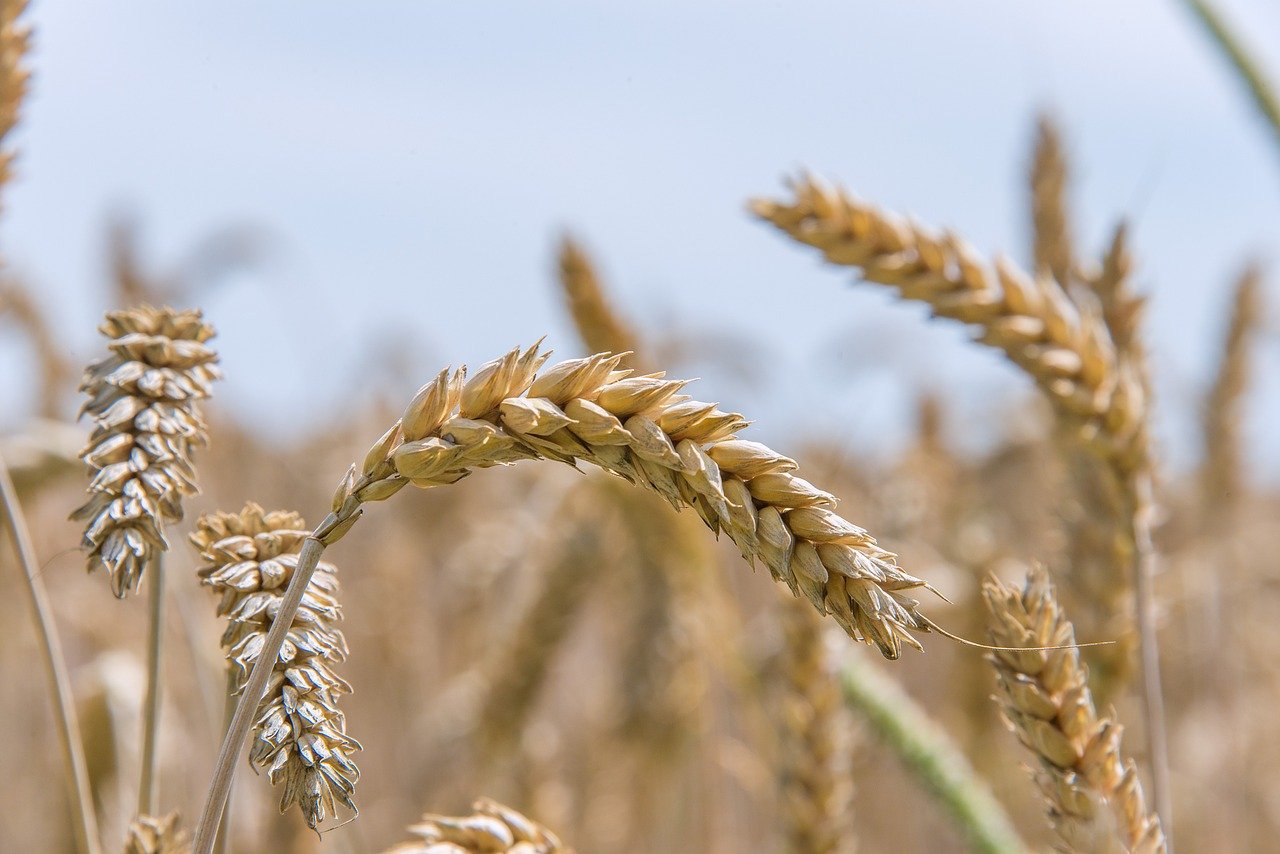
Allergy Management
When it comes to our furry friends, managing allergies can be a major concern for pet owners. Just like humans, pets can suffer from a variety of food allergies that can lead to discomfort, skin issues, and digestive problems. Incorporating whole grains into your pet's diet can be a game changer in this regard. Whole grains are typically less processed than their refined counterparts, making them a safer option for pets with sensitive stomachs and allergies.
One of the biggest advantages of whole grains is their ability to provide a more balanced source of nutrition without the common allergens found in many pet foods. For instance, grains like brown rice, oats, and quinoa are not only nutritious but are also generally well-tolerated by most pets. In contrast, some processed grains, such as corn and wheat, are known to trigger allergic reactions in many animals. By choosing whole grains, you're less likely to expose your pet to these allergens, allowing for a healthier and happier life.
In fact, studies have shown that pets with food allergies often respond positively when their diet includes whole grains. This is largely because whole grains are less likely to contain the additives and fillers that can cause allergic reactions. But it's not just about avoiding allergens; it's also about enriching your pet's diet with essential nutrients. Whole grains are packed with vitamins, minerals, and antioxidants that can help bolster your pet's immune system.
When selecting whole grains for your pet, it's important to consider their specific needs. Some grains may be better suited for certain pets based on their dietary restrictions or health conditions. For example:
| Whole Grain | Benefits | Considerations |
|---|---|---|
| Brown Rice | Rich in fiber and easy to digest | Monitor for any signs of intolerance |
| Oats | High in soluble fiber, good for heart health | Ensure they are cooked properly |
| Quinoa | Complete protein source, packed with nutrients | Introduce gradually to avoid digestive upset |
Ultimately, managing allergies in pets is about finding the right balance in their diet. Whole grains can play a vital role in this process, providing both nutrition and a reduced risk of allergic reactions. Always consult with your veterinarian before making significant changes to your pet's diet, especially if they have known allergies or sensitivities.
- What are the signs of food allergies in pets? Common signs include itching, skin irritations, gastrointestinal upset, and ear infections.
- Can I feed my pet any type of whole grain? While many whole grains are safe, it's important to choose those that are well-tolerated by your pet and to introduce them gradually.
- How can I determine if my pet has a food allergy? Consult with your veterinarian for an allergy test or an elimination diet to identify specific triggers.
- Are there any grains I should avoid? Yes, some pets are allergic to common grains like corn and wheat, so it’s best to avoid these if your pet shows signs of allergies.
Common Allergens in Pet Food
When it comes to our furry friends, food allergies can be a significant concern. Just like humans, pets can suffer from allergic reactions to certain ingredients in their diet. The most common allergens in pet food often include proteins, grains, and even some vegetables. Understanding these allergens is crucial for pet owners who want to provide a balanced and safe diet for their beloved companions.
One of the primary culprits in pet food allergies is beef. Many pets react negatively to beef, leading to symptoms such as itching, gastrointestinal upset, and skin irritations. Another frequent offender is dairy. While some pets may enjoy a little cheese or yogurt, many dogs and cats are lactose intolerant, which can cause digestive distress.
Additionally, chicken is another common allergen. Although it's a popular protein source in many pet foods, it can trigger allergic reactions in some pets. Moreover, grains like wheat, corn, and soy are also known to cause issues for certain pets, particularly those with sensitive stomachs or skin.
It's essential to note that not all grains are created equal, and whole grains, in particular, are often less likely to provoke allergic reactions compared to their processed counterparts. This is where whole grains can shine, providing a nutritious alternative that supports digestive health without the risk of allergies.
Identifying allergies can be a tricky process. Many pet owners may not realize their pets have food sensitivities until they notice symptoms. Common signs of food allergies in pets include:
- Itching or scratching
- Red, inflamed skin
- Digestive issues, such as diarrhea or vomiting
- Ear infections
If you suspect your pet has a food allergy, it's crucial to consult with a veterinarian. They can help you pinpoint the specific allergens through elimination diets or allergy testing. Once identified, you can make informed decisions about your pet's diet, potentially switching to whole grains that are less likely to cause adverse reactions.
In conclusion, being aware of common allergens in pet food is vital for ensuring the health and happiness of your pets. By selecting high-quality, whole grain options, you can help minimize the risk of allergies while providing essential nutrients that support overall well-being.
- What are the signs of food allergies in pets? Look for symptoms like itching, redness, digestive upset, and ear infections.
- Can I feed my pet whole grains if they have food allergies? Yes, whole grains are often a safer alternative compared to processed grains.
- How do I identify my pet's food allergies? Consult with a veterinarian for elimination diets or allergy testing to pinpoint allergens.
Choosing the Right Whole Grains
When it comes to selecting the right whole grains for your pet's food, the choices can feel overwhelming. Just like humans, pets have unique dietary needs, and not all grains are created equal. It's essential to consider factors such as nutritional content, digestibility, and potential allergens. Imagine your pet’s diet as a puzzle; every piece needs to fit perfectly to create a complete picture of health.
First off, you’ll want to look for grains that are not only whole but also packed with nutrients. Some of the best options include:
- Brown Rice: A great source of carbohydrates and fiber, brown rice is easily digestible and provides essential vitamins.
- Oats: Rich in beta-glucans, oats can help to lower cholesterol levels and provide a hearty dose of fiber.
- Quinoa: Although technically a seed, quinoa is a complete protein that contains all nine essential amino acids, making it an excellent choice for pets.
- Barley: This grain is high in fiber and can aid in digestion while providing a satisfying texture that pets enjoy.
When choosing whole grains, it's also crucial to consider your pet's specific health needs. For instance, if your furry friend has a sensitive stomach, you might want to avoid grains that are known to cause digestive issues. Always consult with your veterinarian to tailor your choices to your pet's unique requirements. Think of them as your co-pilot on this journey to optimal pet nutrition!
Additionally, pay attention to the processing of these grains. Whole grains should be minimally processed to retain their nutritional value. Look for pet foods that list whole grains as the primary ingredient, ensuring your pet gets the most benefit. A high-quality pet food will often have a variety of whole grains, which not only enhances the flavor but also provides a broader spectrum of nutrients.
Finally, watch for any signs of allergies or intolerances when introducing new grains to your pet's diet. Just like us, pets can have reactions to certain foods. Gradually incorporate the new grains and monitor your pet’s response. If you notice any adverse effects, it might be time to reconsider your choices.
In summary, choosing the right whole grains for your pet is a balancing act that requires knowledge, attention, and a bit of trial and error. By selecting high-quality, nutrient-dense grains, you can help ensure your pet enjoys a long, healthy life filled with energy and vitality.
1. Can all pets eat whole grains? While most pets can benefit from whole grains, some may have specific dietary restrictions. Always consult your veterinarian.
2. How do I know if my pet is allergic to certain grains? Monitor for symptoms such as itching, digestive upset, or skin issues after introducing new grains.
3. Are there any grains I should avoid? Some pets may react poorly to grains like corn or wheat. It's best to choose grains that are less likely to cause allergies.
Frequently Asked Questions
- What are whole grains and why are they beneficial for pets?
Whole grains are grains that contain all parts of the grain kernel—bran, germ, and endosperm. They are packed with essential nutrients like fiber, vitamins, and minerals that help support your pet's overall health and vitality. Including whole grains in your pet's diet can enhance their nutritional intake and promote better digestion.
- How do whole grains improve digestive health in pets?
Whole grains are a fantastic source of dietary fiber, which plays a crucial role in maintaining healthy digestion. Fiber helps regulate bowel movements, prevents constipation, and supports a balanced gut microbiome, which is essential for your pet's digestive health and immune function.
- Can whole grains help with my pet's weight management?
Absolutely! Whole grains provide a feeling of fullness due to their high fiber content, which can help control your pet's hunger and reduce the chances of overeating. This can be particularly beneficial for pets that need to maintain a healthy weight or lose a few pounds.
- Are whole grains safe for pets with food allergies?
Yes, whole grains are often a safer alternative for pets with food allergies. They are less likely to cause allergic reactions compared to some processed grains. However, it's essential to monitor your pet's reaction to any new food and consult your veterinarian if you have concerns.
- What are some examples of whole grains that are good for pets?
Some excellent whole grains for pets include brown rice, quinoa, oats, and barley. Each of these grains offers different nutritional benefits, so it's a good idea to vary your pet's diet to ensure they receive a balanced intake of nutrients.
- How can I tell if a pet food contains whole grains?
Check the ingredient list on the pet food packaging. Whole grains will typically be listed as the first or second ingredient, and they should be specified as "whole." Look for terms like "whole brown rice" or "whole oats" to ensure you're choosing a product that includes whole grains.

